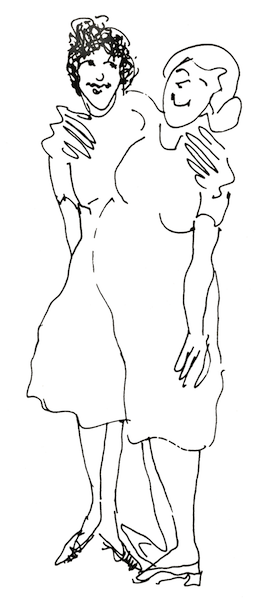18. The Extended Family
Everybody has heard the old saw, “You can pick your friends, but you’re stuck with your relatives.” Relatives—— in-laws, grandparents, aunts, uncles, nieces, nephews——are people who are related legally or by blood, or both. They exist by the nature of things, and no amount of wishing will make them not related. They are part of each person’s extended family.
Do you enjoy your in-laws, grandparents, grandchildren, nieces, or nephews? If you do, then you can treat them as real people, sharing criticisms, doubt, pain, and your love. Maybe it is the other way around, too: if you treat your relatives as real people, then maybe you can enjoy them. All people have some parts that can be enjoyed at a given point in time.
Many times, though, we meet our relatives after we have been conditioned by someone else’s opinions. It is common, for example, for children to hear their parents saying to each other:
“Your father is a tightwad.”
“Your father is just wishy-washy. He does everything your mother tells him to do.”
“Your mother is never going to babysit my children.”
“My mother just loves her grandchildren.”
Parents may even give children direct comments, such as:
“Be careful of your language when your grandmother is around.”
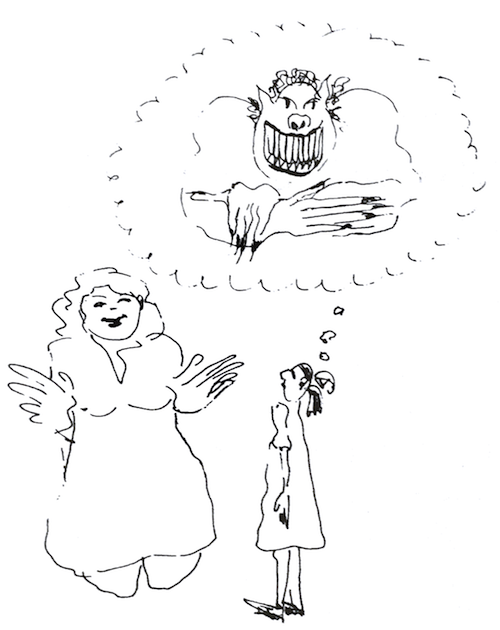
It is easy to see how children get one-dimensional ideas about their relatives. Before ever coming to know them, the children may hear them presented as saints, devils, burdens, or nothings. Each child begins seeing grandparents through the eyes of parents, and this presents some pretty serious handicaps in ever trying to see them as human beings.
Heaven only knows there are plenty of traps among relatives. In some cases there is virtual war; in other cases, simply avoidance. Some people try to handle an existing problem by estranging themselves. I hear people say, “I wish my children could know their grandparents. I feel bad about that sometimes. But it is so painful to visit them.”
Or, “My mother is always spoiling the kids, yet I want them to know her.”
Or, “My father shows partiality to my son and ignores my daughter” or vice-versa.
You have probably heard these remarks and many more like them. I hear these kinds of things as extensions of whatever the speaker hasn’t worked out in his or her feelings about self. This person not only doesn’t consider the adults in the family as people, but confuses these relatives with their roles. This is very common.
Husbands and wives do this kind of thing to their parents, too, by labeling them “the old people.” Once you hang a label on someone (“old,” “auntie,” “grandpa,” whatever), it is easy to stop thinking of him or her as a person. Such labels form a large part of the atmosphere in which the extended family finds itself. The generation gap, then, exists as much between parents and grandparents as it does between parents and children. I define the generation gap as an area of strangeness that has not yet been bridged.
On the other hand, if the spouses have become peers to their parents, then all of them can be people together. Each can be treated as a unique, valued person. They can respect one another’s privacy, enjoy what is enjoyable about one another, and try to change the parts of life that are less pleasant.
These people take the people point of view instead of the role point of view. The husbands and wives of today are the grandparents of twenty years from now. The children of today are the husbands and wives of tomorrow, and the grandparents of the future. And throughout all of this, it is Jane who is a wife, Jane who is a mother, and Jane who is a grandmother. No matter what role she assumes, she is Jane, the person.
In other words, husband, wife, parent, child, grandparent, and grandchild are names of roles that people assume as they go through life. The roles describe two things: how one person is related to another, and how this particular role is lived out. Essie Hawkins is my grandmother on my father’s side; or Essie Hawkins says that Jane Sutter is her grandchild, the daughter of her son, Harry. When Essie and Jane meet, who are they meeting? People or roles? Roles are sterile and awesome; people are exciting and human.
Once realized, this is pretty obvious, yet so many miss it. Underneath every role name is a personal, given name——Alice or Marco or Leilani or Wadsworth——and a person who lives that role. Roles are like different clothes or hats one wears, depending on what one is doing at any moment.
Let me illustrate. Alice Sweetworth, forty-six, is married to Guy Sweetworth, forty-seven. They have been married twenty-six years. Alice and Guy have three children: Margaret, twenty-five; Bruce, twenty-three; and Allan, seventeen. Margaret is married to Hans, thirty. Bruce is married to Anita, also twenty-three years old, and they have one child.
When Guy is with Alice, he calls himself husband because he and Alice are married and do marital things together. When he is around Margaret, Bruce, or Allan, he wears his father hat, assuming that he is doing something that fits into his idea of what fathering is all about. When he is with Hans and Anita, he is a father-in-law, doing whatever that role asks of him. When he is with Margaret’s kids, he is a grandfather.
Now, suppose he is in the presence of all these people. He then can put on any one of these hats. Yet I know people
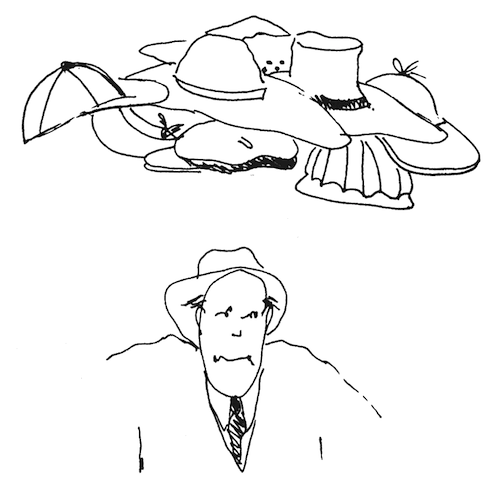
who, by the time they get as far as Guy is in life, wear only grandfather hats. Their father-in-law, father, husband, and self parts somehow just went away.
I remember a family who came in to see me once. Ethel, the wife in the family, brought her seventy-three- year-old mother, who was introduced to me as Grandma. I looked at her when I took her hand, and I asked her what her name was. At first she looked at me blankly, and then finally, after a few moments, said very softly, “Anita.”
So I said, ‘‘Hello, Anita.” At this point, the tears streamed down her face. She said it was the first time she had heard her given name in almost twenty years.
Seeing Anita as a person, not just a grandmother, was a very important factor in this family’s opening up to some new ideas about how they could work together as people.
Any role name is merely descriptive. Why not let people be who they are, and do what they do, and never mind their titles, whether aunt or uncle, cousin or parent? First and foremost, these are people. I don’t know of any universal behavior that means mothering, fathering, husbanding, wifing, aunting, or uncling, and I’ve never found anybody who did. To live a role is an invitation to squeeze the life out of oneself; to live as a person invites flexibility and fullness.
An important adjunct to all this is that people in families almost always think they really know one another. You know this. What parent doesn’t feel he or she knows each child up to the age of fourteen or fifteen? What individual doesn’t think she or he knows mother and father? I have found that family members who feel this way are the most likely to be strangers to one another. What they think is a given person is more likely to be his or her role.
The cure for this gap is for each family member to get acquainted with the others as persons. This process needs to be consciously updated from time to time. Let’s face it: doing this with people to whom you are legally or blood related is quite hard because of the pesky assumption you already know them. Few people who feel they know each other really share their deeper feelings.
Family members often get stuck with one of their roles, and then that role seems the same as their identity. I am convinced that many of the problems among older people and other members of the family arise because the oldsters’ feelings about themselves are tied up in their role of being older people. They forget, and people around them forget, that the heart still beats and that they still wish and need to be loved and valued and to have a purpose.
Like the dreams we pursue, this sense of purpose guides us through the day. A person starts out at birth into a new area of growth that continues until death. If we were to do what is possible for us as human beings, we would be constantly evolving as well as aging. A great deal of evidence now shows that one’s body follows one’s feeling of worth: the state of one’s skin, bones, and muscles is more related to how one feels about oneself than almost any other single factor, with the possible exceptions of nutrition, exercise, and interactions with the people with whom one lives. Furthermore, people who are more prone to illness very often have incomplete, distorted, and undesirable images Of themselves.
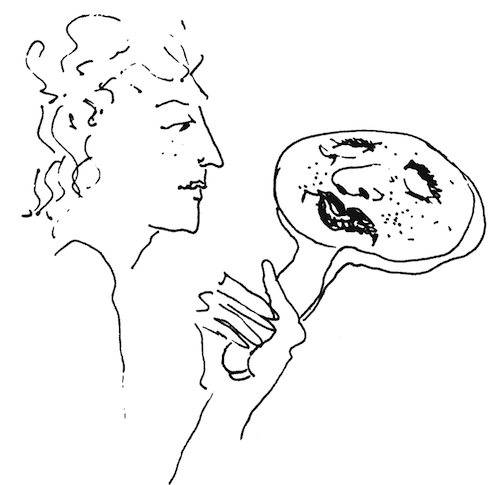
Just as ironclad roles are inhumane, family ritual and traditions become troublesome when people regard them as demands rather than celebrations. An effective use of ritual is to develop ways of doing things that reflect a certain family’s life-style. A family I know has a ritual that when each child becomes fifteen, she or he automatically gets a watch; at sixteen, he or she can drive a car; and so on. Rituals such as these serve as indications of what is significant in a family, but they aren’t written in blood; they can be changed from time to time.
Another use of ritual is to indicate a sense of belonging——a kind of clan symbol. Furthermore, a ritual does not require that everybody be present. Some of the worst kinds of things that happen in families are demands that every member of the family be present——at holidays, let us say, at the home of the older generation. I know some young couples who absolutely ruin their holidays because they feel they must spend Christmas with both the husband’s parents and then the wife’s parents. And so they busy themselves with eating two dinners, enjoying neither.
Such young couples experience a terrible frustration. They feel the pull of having to go to either or both sets of parents and, at the same time, wanting to have something of their own. One couple I know believed they had to go to his mother’s home every Friday night or terrible things would happen: his mother or grandmother would have a heart attack and then punish the couple by never speaking to them again or cutting them out of her will. That’s a pretty heavy price to pay for peace in the family.
When you make choices to count your own preferences on a par with others’, you may encounter some negative reactions. People can survive this, even if they vehemently resist your changes at first.
The most hurtful thing my daughter could do would be to come to my home for dinner on Christmas so my feelings wouldn’t be hurt. I would feel I had failed miserably in helping her develop as an autonomous person.
A large portion of things that make for difficulty involve adults who haven’t learned to let go of the parent-child relationship with their own parents. This relationship needs to be transformed. The two generations need to develop a peer relationship with each other, in which each respects the other‘s privacy and autonomy and both can come together when it fits. In this way, the adult children are also well situated to parent their own kids.
To turn this around, I have had many people in their sixties seek my help to get their grown-up offspring of their backs: “They are always bossing me around and telling me what to do.” It is a new idea to some adults that their parents might not automatically welcome their advice.
Many binds occur from our awareness of others’ loneliness, which we may feel we have to relieve. This can turn into a burdensome chore. That is, you are my mother and I see you as lonely; you don’t have any friends, and I don’t find much joy with you because you’re always complaining. But I go over to see you and sit through the visit with clenched teeth, or else I bug you with telling you what you should do and then get frustrated because you won’t do it. Many people attempt this and then pay for it with their anger and guilt. A person who is grown up is free to say yes and no realistically and, at the same time, able to feel balanced about standing up for self.
This leads to another point: helping. Because of disability or illness, many people need the help of their children. How can two people give and receive help from one another and yet feel like equals? Sometimes the effort to help ends up in the familiar old blackmail (the “clutch”): “You must help me because you are my sons. I can’t do anything, I’m so little and feeble,” or, “You are my parent and you must let me help you.”
Again, this kind of thing represents two people who have not yet learned to stand on their own feet and so are handling their transactions by trying to control others instead of attracting them. Anyone looking around at families today can see hundreds of examples of people blackmailing one another under the guise of helplessness and helpfulness. Success for parents means feeling valued, useful, cared about, and liked but not clutched by their children. I think the converse is true for the children. If they feel their parents value them, find them useful, care about them, like them, and don’t clutch at them, they too feel that their parents are successful.
At times, of course, people need bona fide help. But the times “help” is used to clutch are far more numerous. I can
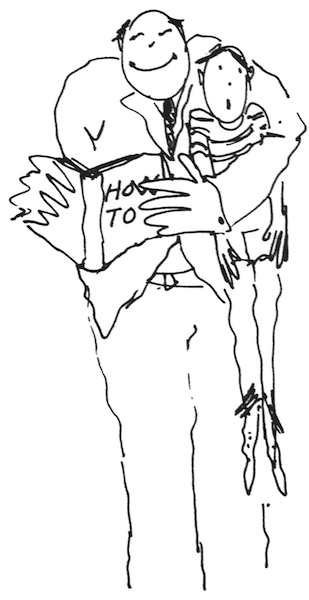
just hear some of you as you read this: “How else could I have contact with my daughter-in-law, my son-in-law, my mother-in-law, my father-in-law, my mother, my father, my daughter, my son? The kind of thing you’re describing could never happen between us because there has never been any joy between us. My mother-in-law never wanted me to marry her son anyway. My father doesn’t like my husband. [My mother didn’t want me to marry my wife.] My mother-in-law is always wanting my husband to do things for her.” And on and on.
It doesn’t happen overnight, and it is not easy. It is possible. All I can say to you is that no people are 100 percent one way. Do some exploring and discovering of these people and yourself with a fresh view.
There are varying degrees of how much one can enjoy others. I don’t mean to imply that everybody can enjoy everybody else equally. That would be quite unrealistic. However, most families can come together and work together in new ways once each member knows to the bone that all people are made up of parts and no one has to love the unlovable parts. Furthermore, these parts do change from time to time.
People can have honest, real relationships with one another, and they can live in harmony. As I’ve said before, it is simple, but it is not easy. This is an important point to remember. In particular, children often get caught in the middle between parents and grandparents. This is an almost overwhelming spot for a child. How can he or she go against a grandmother who gives a great deal of joy when the mother is saying that the grandmother is no good? The child’s experience is quite different: the mother may be talking about her relationship with her mother-in-law. Conversely, a grandmother may tell the child that his or her father is no good, when the child’s loyalty and maybe even experience do not validate this.
It is all too easy to project onto another person some of your problems, and then ask someone else to go along with you to make you feel right about your conclusion. Lots of problems in the extended family come about this way.
Other difficulties arise for people who are just beginning new roles as auxiliary members in the families of their grown-up children. Many grandparents like to babysit and freely offer to do so. However, I’ve known other grandparents who felt uncomfortable telling their children they did not want to sit for them. If this bind is present, there’s going to be trouble. Sometimes the life-needs or the life-plans of the people who are grandparents don’t allow for babysitting. Sometimes grown-up children who don’t have a peer relationship with their own parents exploit them; and then the parents, having settled for only a grandparenting role in life, respond by feeling resentful inwardly. And sometimes people in the family——the current parents and grandparents——do not get along, and when Grandma or Grandpa sits with the children, there is really apt to be difficulty.
I see nothing wrong in extending help to family members if it is done as a result of two people coming together and considering the life needs of each. Requests such as “You have to do this because you’re my mother” or “You have to let me do that because I am your daughter” change the whole negotiation for help into one of control. Unfortunately, the children are often the ones who get sacrificed. As mentioned, family members frequently blackmail each other in the name of love and relationships. This is one of the reasons so much pain exists in families.
When we look at it, any extended family is composed of three generations, sometimes four. All of these generations are relating somehow and affecting each of the other generations. It’s hard for me to think of a family without including the third generation——the people who are the parents or grandparents of the current husband and wife. After all, we become the next family architects by learning from the previous ones.
I can foresee the time when families will conduct themselves so that grown children will be peers to their own parents: self-reliant and autonomous, instead of remaining children to them or becoming parents to them. To me, this is the end point of peoplemaking: that children become autonomous, independent, creative people who are now peers to the people who introduced them into the world.
